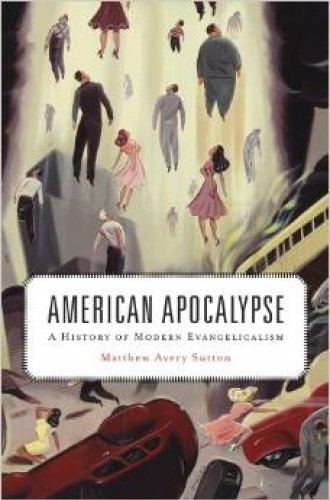American Apocalypse, by Matthew Avery Sutton
Why do most white evangelicals vote Republican? How has this affected Republican politics? In American Apocalypse, Matthew Sutton, author of a prize-winning biography of Aimee Semple McPherson, gives us our first good account of how and why evangelical political views developed the way they did. Three elements were crucial—premillennial eschatology, World War I, and the Puritan heritage. Oh, and a fourth: white evangelicals were not African American.
The book opens by describing a new way of reading the Bible called dispensational premillennialism, which became popular in the late 19th century. Leaders of this movement came primarily from the two holiness traditions—Wesleyan holiness and its Pentecostal offspring, and Keswick (Higher Life) holiness, a British variant. Sutton calls these folks “radical evangelicals,” and for good reason. Many of their ideas and attitudes put them outside the norms of conservative middle-class Protestantism.
Sutton notes that dispensationalism was anything but conservative. In an era when most Christians thought the world was getting better, dispensationalism taught that it was getting worse. The Bible predicted that unprecedented natural disasters, accelerating wickedness, global wars, social chaos, apostasy of churches, Jewish reconstitution of Israel in Palestine, and a new European empire ruled by the Antichrist would finally culminate in the rapture, when true Christians would supernaturally rise to meet Christ in the air. Then, after a seven-year period of totalitarian oppression and world conflict, Christ would return, defeat the Antichrist in the earth-shaking battle of Armageddon, and inaugurate the millennium.





